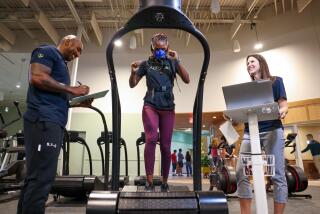Well coached
- Share via
Dan Belisario, 47, first met Gary Scheiner more than 10 years ago. Belisario had just been given an insulin pump for his Type 1 diabetes, and he worked with Scheiner, a diabetes coach, to incorporate the new device into his life.
After he became comfortable with the pump, his visits with Scheiner tapered off; he’d skip a few months, or even a year.
But that changed last September, when Belisario, a sales manager from New Jersey, met with an ophthalmologist.
“There’s a vessel in the back of my eye that’s swollen,” he says; it’s a complication of diabetes that results from continued high blood sugar. If the problem continues, Belisario could lose his sight.
So he’s begun seeing Scheiner in person every six weeks, at the coach’s suburban Philadelphia office. They review Belisario’s workouts, meals, snacks and blood sugar readings in great detail. A self-described “constant eater” -- a habit that can keep his blood sugar dangerously elevated -- Belisario also emails Scheiner between appointments with questions and pictures of his food.
And he has seen the results.
“My blood sugar numbers are the lowest they’ve been in a long time,” he says. He’s developed a meal plan to reduce snacking, and counts carbs to within inches of their lives. If his blood sugar stays low, he says, “the swelling in the back of my eye will go down.”
For more and more Americans, diabetes is becoming a reality. Rates of the disorder are steadily climbing, and the Centers for Disease Control and Prevention estimates that 25.8 million people in the United States -- 8.3% of the population -- have either the Type 2 or Type 1 version of the disease. Among those born in 2000, the CDC estimates that 1 in 3 will eventually be affected.
Diabetes causes health problems by impeding the body’s ability to process glucose, which leads to unregulated blood sugar. Those with Type 1 produce little to no insulin, a protein that controls blood glucose. Those with Type 2, which generally develops in adulthood and is more common among older and overweight people, do produce insulin, but their body has become resistant to it.
Over time, both types can lead to nerve damage, amputations, blindness, kidney failure and cardiac arrest.
In order to mitigate these risks, people with diabetes have to constantly monitor their health. A Type 1 diagnosis means testing blood sugar multiple times a day, and often taking insulin in step with meals and physical activities. Those with Type 2 might also need insulin, along with other medications that lower glucose levels. Nearly all of those with diabetes must make significant changes in the way they eat and exercise.
“For a lot of people, it’s almost as if they have a second job,” says Nora Saul, nutrition services manager at Joslin Diabetes Center in Boston.
That’s how it’s felt for Alex Picker, 37, who’s had Type 1 diabetes since age 14 but decided to drop some extra pounds this year. “My blood sugars have always been under control, but I’ve taken my job of managing my diabetes more seriously.”
After changing his eating habits and introducing daily exercise, the mortgage banker from the Philadelphia area says he noticed changes: “For whatever reason,”my insulin doesn’t work as well.”
That’s where specialists like Scheiner, who now sees Picker once a week, come in. Though patients with diabetes often have many specialists they can visit -- endocrinologists, dietitians and ophthalmologists, in addition to a primary care physician -- daily management of the disease can feel overwhelming.
“We have done a good job in diabetes care of telling people what to do to manage diabetes -- but we haven’t told them how to do it,” says Martha M. Funnell, a diabetes researcher at the University of Michigan in Ann Arbor.
The field of diabetes coaching is in its infancy -- no official registry exists, and some diabetes experts aren’t familiar with the profession. But many agree that the services coaches provide are an important part of the future of diabetes care, as long as the coaches are reputable.
“You just want to make sure that whoever you’re hooking up with has experience in doing this,” says Geralyn Spollett, a nurse practitioner and president-elect of healthcare and education at the American Diabetes Assn.
There is no formal required training to earn the title “coach” -- and because of that, those in the profession have varied levels of qualifications and expertise. Many, like Scheiner, are certified diabetes educators: healthcare professionals who are trained to work specifically with people with diabetes. Others are registered nutritionists, exercise physiologists, nurses or certified life coaches.
What they all should offer, though, is consistent help in navigating the daily choices that can mean the difference between good health and the onset of complications, things like preparing three meals a day, taking a walk instead of tuning in to “Law & Order” or bidding adieu to a beloved bedtime snack.
“With diabetes, there are 1,001 questions and decisions that have to be made every day,” says Scheiner, who has Type 1 diabetes himself. “The vast majority of people need some extra guidance.”
Chris Locke, 63, of Acton, Mass., sought the help of diabetes coach Mark Josefsberg earlier this year.
“I’ve been diabetic for nine years -- Type 2 -- and have had a lot of trouble controlling my blood sugar,” she says. “Eventually, my numbers got so high that it put the fear of God into me.”
On the advice of a colleague, Locke, a teacher who works with hearing-impaired kids, gave Josefsberg a call. They had their first session over the phone -- Josefsberg is based in New York and works with most of his clients remotely -- and Locke says she noticed a difference immediately.
Josefsberg provided support during a stressful week when, Locke says, all she wanted to do was “grab a loaf of bread.” He also recommended that she see an endocrinologist and encouraged her to do what may once have been unimaginable: get rid of the ingredients she had lying around that allowed her to whip up batches of cookies and brownies on a whim.
“I love to bake,” she says, “but I cleaned out all the stuff I could easily throw together. I just flung the items into a bucket.”
Like many in the field of diabetes education, Josefs- berg’s interest in helping others came after he received his own diagnosis of Type 2 diabetes in 2002. “I made it a huge priority to take care of myself,” he said -- reading books and studies about the disease, and modifying his diet and exercise in accordance with his blood sugar. “People started to refer me to friends.”
He went on to get certified as a life coach and now focuses on helping clients with diabetes find motivation to stay healthy and identify obstacles in their lives -- such as creating time to manage their disorder or overcoming the depression it can cause -- that may be holding them back.
Little research, if any, exists on the effectiveness of diabetes coaching. But a growing number of studies support the notion that consistent, personalized contact with a trained individual helps those with diabetes manage their disease.
One such study was conducted by the National Diabetes Education Program about 10 years ago. A major clinical trial, it involved 3,234 people at risk for Type 2 diabetes and examined whether lifestyle interventions or medications would lower participants’ likelihood of developing the disease.
The findings, published in the New England Journal of Medicine in 2002, showed that those who received intensive counseling from case managers with experience in nutrition, exercise or behavior modification were able to reduce their risk of developing diabetes by 58% over the course of three years.
More recently, a study published in October in the Archives of Internal Medicine examined the blood sugar levels of 623 people with Type 2 diabetes. The results supported those of the 2002 study: Over the course of seven months, patients who received individual education delivered by nurses and dietitians who were also certified diabetes educators were able to significantly lower their blood sugar.
These findings aren’t surprising, Spollett says. “Patients who have lifelong diabetes need to have someone in their corner who knows how to help them make the daily decisions, to bounce things off of, to encourage them. Behavioral change is difficult to achieve.”
Adds Margaret Moore, a co-director at the Institute of Coaching at Harvard Medical School’s McLean Hospital, “A good coach helps you talk about what makes your life worth living -- what you value and treasure and what will provide the drive to make change.”
Working with a coach is not an option for everyone. It generally isn’t covered by insurance, and sessions can run $50 to $150 each -- an expense that isn’t likely to be taken on if simply paying for medication already is a challenge.
People for whom finances are a concern can still find ongoing education and support, though. Doctors are often willing to provide referrals to experts such as dietitians, and many hospitals offer group classes or employ certified diabetes educators to answer patients’ individual questions. Some of those educators are willing to hear from patients at any time of day.
“We always give them our phone numbers in case they have questions,” said Susan Morris, a registered nurse and certified diabetes educator at the Central Mississippi Medical Center in Jackson. “They can always call.”
Once people who start working with a coach go through what experts describe as the necessary grieving process that accompanies being diagnosed with a chronic illness, many -- like Belisario -- find reasons to stay healthy.
If his diabetic retinopathy gets worse, he may have to undergo a risky and painful surgical procedure.
But much more motivating than that, he says, are his kids, a 5-year-old and an 8-year-old. “I want to see their artwork,” he said. “I want to see them play sports, sing in the play. I want to watch them grow up.”
--






